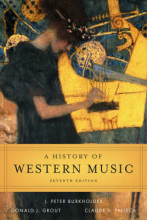Summary: A History Of Western Music | 9780393979916 | Burkholder
- This + 400k other summaries
- A unique study and practice tool
- Never study anything twice again
- Get the grades you hope for
- 100% sure, 100% understanding
Read the summary and the most important questions on A History of Western Music | 9780393979916 | Burkholder
-
13 New Styles in the Seventeenth Century
This is a preview. There are 9 more flashcards available for chapter 13
Show more cards here -
What had a major effect on music in the 1600s and why?
Religious and political conflicts -- because rulers and church authorities remained important patrons -
What did the rise of capitalism do to help music?
Put money in the hands of individuals, giving rise to public opera and concerts, and increasing demand for published music, instruments, and lessons. -
Which country was best for musicians who relied on patrons and why?
Italy because rulers, cities, and leading families supported music and the arts as a way of competing for prestige -
What year were the first public opera houses established in Venice?
1637 -
What year were the first public concerts in England?
1672 - but the practice did not become widespread in Europe until the later 1700s -
Baroque period dates
1600-1750 -
Most striking aspect of seventeenth century literature, arts, and music...?
Its focus on the dramatic - Baroque virtues of drama, dynamism, and emotional expression -
prima pratica vs. seconda pratica
Monteverdi and his brother coined these terms and said that in the "first practice" one had to follow the rules and so the music dominated the text.
In the "second practice" voice-leading rules can be broken in order to express something in the text. -
Vespro della Beata Vergine
"Vespers of the Blessed Virgin" choral piece by Monteverdi published in 1610 -
14 The Invention of Opera
This is a preview. There are 10 more flashcards available for chapter 14
Show more cards here -
By mid-seventeenth century, Italian opera had acquired the 3 main features it would maintain without essential change for the next 200 years. They were:
1. concentration on solo singing
2. separation of recit and aria
3. use of varied musical styles
- Higher grades + faster learning
- Never study anything twice
- 100% sure, 100% understanding
Topics related to Summary: A History Of Western Music
-
Music for Chamber and Church in the Early Seventeenth Century
-
France, England, Spain, and the New World in the Seventeenth Century
-
Italy and Germany in the Late Seventeenth Century
-
The Early Eighteenth Century in Italy and France
-
German Composers of the Late Baroque
-
Opera and Vocal Music in the Early Classic Period
-
Instrumental Music: Sonata, Symphony, and Concerto at Midcentury
-
Classic Music in the Late Eighteenth Century
-
Revolution and Change
-
The Romantic Generation: Song and Piano Music
-
Romanticism in Classic Forms: Orchestral, Chamber, and Choral Music
-
Romantic Opera and Musical Theater to Midcentury
-
Opera and Music Theater in the Later Nineteenth Century
-
Late Romanticism in Germany and Austria
-
Diverging Traditions in the Later Nineteenth Century
-
Miscellaneous Remaining Things from the Study Guide
































